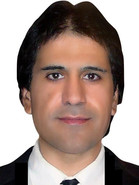Source: english.alarabiya.net
By Dr. Majid Rafizadeh

The news regarding the Islamic Republic’s massacre of more than 30,000 political prisoners attracted the attention of the national and international media outlets.
Nevertheless, many human rights and political activists are protesting the notion that no concrete and legal actions have been taken by the International Criminal Court (ICC), the United Nations or human rights organizations to hold Iranian leaders accountable.
Some argue that the international community should prevent this crime against humanity to be forgotten in the dust of history and should give voice to the families of the victims. This issue highlights the notion that the West is increasingly viewing the Islamic Republic through geopolitical and tactical prisms, rather than from a human rights point of view.
Holding Iran accountable?
A new resolution by the US Congress appears to give hope to the families of victims who were hung, shot and buried in mass graves.
The Congress resolution is being introduced by the House Homeland Security Chair, Mike McCaul, and cosponsored by Chairman Ed Royce, Ranking Member Eliot Engel, and Rules Committee Chair Rep. Sessions. McCaul quotes late Hussein Ali Montazeri a grand ayatollah who served as Khomeini’s chief deputy, calling the Islamic Republic’s massacre “the greatest crime committed during the Islamic Republic, for which history will condemn us”.
The resolution states: “Condemning the Government of the Islamic Republic of Iran for the 1988 massacre of political prisoners and calling for justice for the victims. Whereas over a four-month period in 1988, the Government of the Islamic Republic of Iran carried out the barbaric mass executions of thousands of political prisoners and many unrelated political groups; Whereas according to a report by the Iran Human Rights Documentation Center, the massacre was carried out pursuant to a fatwa, or religious decree, issued by then Supreme Leader Ayatollah Ruhollah Khomeini, that targeted the People’s Mojahedin of Iran (PMOI), also known as the Mujahedeen-e-Khalq (MEK)”.
This Congressional resolution consists of two crucial parts. The first part sheds light on the crimes committed by the Islamic Republic of Iran. The resolution references Amnesty International and other credible sources. According to a November 2, 2007 report by Amnesty International, “between 27 July 1988 and the end of that year, thousands of political prisoners [in Iran], including prisoners of conscience, were executed in prisons nationwide.”
Accordingly, a Judge from Iran’s Ministry of Intelligence and a government prosecutor (known as the “Death Commissions”) ordered the elimination of opponents.
Many of those who were involved in the massacre are currently serving higher positions in Iran. For example, Mostafa Pourmohammadi was a representative of the intelligence ministry to the notorious Evin prison, and he was recently appointed by the so-called moderate president Hassan Rowhani to be justice minister. Ebrahim Raeisi was a public prosecutor and is appointed under Rouhani government to be the head of Astan Quds Razavi, which has billions of dollars in revenues.
The procedure for the executions proceeded very fast while some of those who were executed were teenagers and even pregnant women. Prisoners “were executed in groups, some in mass hangings and others by firing squad, with their bodies disposed of in mass graves”. Many, including members of the Baha’i faith, were reportedly brutally tortured. The authorities did not inform their loved ones about their whereabouts.
In the second part, the Congressional resolution lays out concrete steps and recommendations to be followed in order to hold the Islamic Republic accountable. “Resolved by the House of Representatives (the Senate concurring), That Congress— condemns the Government of the Islamic Republic of Iran for the 1988 massacre, and for denying the evidence of this manifest set of crimes against humanity,” it says.
The second step is to urge “the Administration and United States allies to publicly condemn the massacre, and pressure the Government of Iran to provide detailed information to the families of the victims about their loved ones and their final resting places”.
Finally, the Congress should urge “the United Nations Special Rapporteur on the human rights situation in Iran and the United Nations Human Rights Council to create a Commission of Inquiry to fully investigate the massacre and to gather evidence and identify the names 15 and roles of specific perpetrators with a view towards bringing them to justice”
Policy recommendations
If other governments and members of the United Nations enact similar resolutions, Iranian leaders will be pressured to provide more information. In addition, the United Nations Special Rapporteur on the human rights situation in Iran can play a crucial role, by opening a full investigation to hold those officials accountable.
Finally, if the West truly stands for social justice, liberty and democracy, Iran-West and Iran-US relations should not be primarily anchored in tactical and geopolitical landscapes, but should focus more fundamentally on human rights issues.
_____
1. Dr. Majid Rafizadeh, an Iranian-American political scientist and Harvard University scholar, is president of the International American Council. Rafizadeh serves on the board of Harvard International Review at Harvard University. He is also a member of the Gulf project at Columbia University. Rafizadeh served as a senior fellow at Nonviolence International Organization based in Washington DC. He has been a recipient of several scholarships and fellowship including from Oxford University, Annenberg University, University of California Santa Barbara, and Fulbright Teaching program. He served as ambassador for the National Iranian-American Council based in Washington DC, conducted research at Woodrow Wilson International Center for Scholars, and taught at University of California Santa Barbara through Fulbright Teaching Scholarship. He can be reached at [email protected], @Dr_Rafizadeh.
Leave a Reply